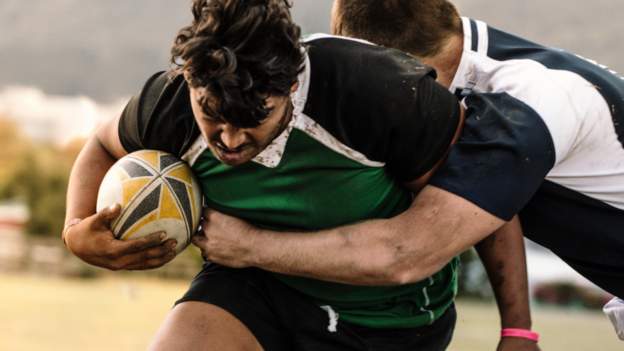
More than 55 former amateur rugby union players say the sport's governing bodies failed to protect them from permanent brain injury.
Lawyers representing the group say they have written to World Rugby, the Welsh Rugby Union and Rugby Football Union setting out their case before a potential lawsuit.
It follows a similar move involving more than 200 ex-professional players.
World Rugby, the WRU and RFU say they are "progressive" on player welfare.
This latest claim involves retired female internationals and players involved in the men's game before it turned professional in 1995.
Former elite youth players and the family of a male player who was found to have chronic traumatic encephalopathy (CTE) in his post-mortem are also part of the group.
CTE is a brain disease which can develop when the brain is subjected to numerous small blows but it is only detectable after death.
Law firm Rylands Garth says the amateur players it represents, as well as wanting financial compensation to support themselves and their families, hope to "help make the game safe for future generations".
Rylands Garth says the symptoms its clients have suffered include chronic depression, aggression and violence, significant memory loss and addiction
They have called on rugby union's governing bodies to make a number of immediate changes.
These include: a mandatory limit on contact in training, setting up a brain injuries passport, using independent neuro-experts for research and guidance and ensuring those who have suffered a concussion spend 28 days out before returning to play.
"This is a life-and-death issue for many," said Richard Boardman, of Rylands Garth, which is also helping former rugby league and football players bring similar brain injury claims.
"It doesn't matter what level of the game you played or are playing at, whether it's at school or adult rugby, and as a professional or amateur, male or female, we are sadly seeing the same alarming neurological impairments at all levels of the game."
In this latest claim, it is argued rugby union's governing bodies "negligently failed to protect them from concussive and sub-concussive injuries".
How have the governing bodies responded?
World Rugby, the WRU and the RFU issued a joint statement saying: "Rugby is a sport that provides many lifelong health and wellbeing benefits for participants at every level. It is loved by millions of current and former players around the globe.
"We care deeply about every member of the rugby family and have been saddened by the brave personal accounts of former players who are struggling with any health issues. We want them know that we care, we listen, and we never stand still when it comes to rugby being the most progressive sport on player welfare.
"Acting on the latest science, evidence and independent expert guidance, we constantly strive to safeguard and support all our players - future, current, and former. Rugby is a leader in the prevention, management and identification of head impacts and we proactively fund transformational research, embrace innovation and explore technology that can make the sport as accessible, inclusive and safe as possible for all participants.
"As we have not yet been served with the details of the claims against us, it is not possible for us to comment further at this time."
If you are affected by any issues relating to this story then please go to BBC Action Line for information and support.















 Phone: (800) 737. 6040
Phone: (800) 737. 6040 Fax: (800) 825 5558
Fax: (800) 825 5558 Website:
Website:  Email:
Email: 






